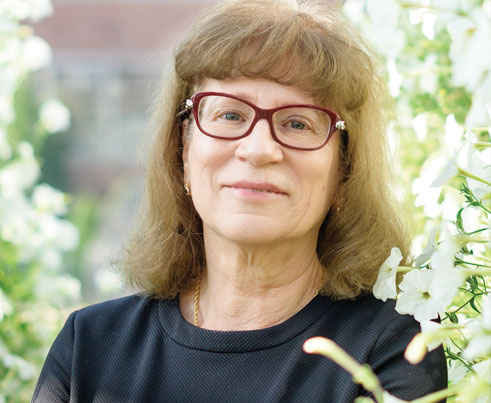Herbert Newby McCoy Award Current Recipient

Natalia Dudareva – 2018 Herbert Newby McCoy Award
Natalia Dudareva is a Distinguished Professor and teaches in the departments of Biochemistry and Horticulture and Landscape Architecture at Purdue. She earned her bachelor's and master's degrees in biochemistry from Novosibirsk State University in Russia. She received a PhD in biochemistry and molecular biology from the O.V. Palladin Institute of Biochemistry, Kiev, Ukraine, and a second PhD in plant molecular biology from the Louis Pasteur University, Strasbourg, France.
Dudareva came to Purdue in 1997 and was named a distinguished professor in 2010. She joined the Department of Biochemistry in 2013.
Dudareva has published 116 papers, 25 book chapters and two books, and has given 200 invited lectures at conferences and other universities. She has received recognition for her research as a Purdue University Faculty Scholar and the Wickersham Chair of Excellence in Agricultural Research. She has been awarded the Purdue University Agricultural Research Award, the Sigma Xi Faculty Research Award, and the Alexander von Humboldt Research Award (Germany). She is a fellow of the American Association for the Advancement of Science.
Look Who's Talking: Chemical Language of Plants
Abstract
Plants have exploited the language of small chemicals for interacting with their environment more extensively than any other living organism. A diversity of volatile molecules released by plants plays essential roles in their growth, development, reproduction, defense and communication. They also influence atmospheric chemistry and climate, and humans use them as flavors, fragrances, biofuels, insecticides and pharmaceuticals.
Dudareva will discuss different aspects of volatile emission: from volatiles' function and their perception by insects, to biosynthesis, regulation and how plants deploy these compounds into the atmosphere. In addition, she will talk about what limits volatile trait modification and will outline biotechnological approaches for improving crop productivity and defense, as well as improving flavor and aroma.
Research Accomplishments
Over the past 20 years, Dudareva has explored the molecular mechanisms of plant metabolism and how plants produce volatile compounds, scent and taste components that are essential for successful pollination, fruit development and plant defense.
Using biochemical, genetic and molecular approaches, Dudareva has provided insights into fundamental plant biology. She also has pioneered research into the biosynthetic pathways that underpin plants' strategies for attracting pollinators; communicating with other plants; and defending themselves from pathogens, parasites and herbivores.
Dudareva's research has led to the discovery of a microbial-like pathway in plants to produce phenylalanine, an amino acid that is a vital component of proteins. She also showed that active biological mechanisms are involved in transporting plant volatiles from plant cells to the atmosphere, a finding that could overturn the prevailing model of volatile emission as a process that occurs solely by diffusion.
Other research by Dudareva and her collaborators includes:
- Elucidating the molecular architecture and dynamics of phenylalanine biosynthesis in plants.
- Deciphering the complex terpenoid metabolic network and its regulation.
- Discovering the biochemical pathways leading to benzoic acid formation.
- Identifying biomolecular processes involved in the release of plant volatiles into the atmosphere.

